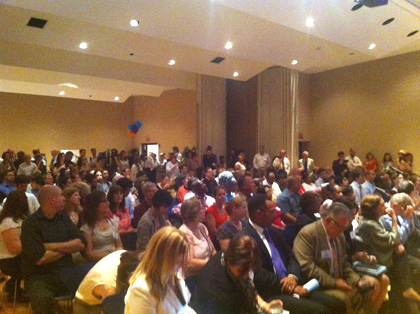The Philadelphia City Planning Commission voted unanimously last evening to approve the city’s comprehensive planning vision, Philadelphia2035, during an event honoring the process and officially kicking off implementation of the plan.
In front of more than 150 people at Moore College of Art & Design on the Parkway, Mayor Michael Nutter stopped by to congratulate the Commission, community groups and citizens on a visioning process that included months of interviews, planning, public comment and revision, before Deputy Mayor Alan Greenberger called the Commission to vote.
Perhaps more relevant to our audience of technology users in Philadelphia, the evening also marked the official acknowledgment and inclusion of a plan for broadband as a vital public utility.
Describing a section of goals in the plan dedicated to utilities, Greenberger asked the crowd to imagine that “our entire population is connected virtually with state-of-the-art broadband infrastructure, further enabling life-long learning and employment access.”
“Those are great goals,” he added.
In May, Technically Philly submitted comment to the Commission solicited through reader feedback and by asking broadband leaders for their input. After careful deliberation with technology leaders in the region, the Planning Commission has added a section to the comprehensive plan’s utility section that addresses a plan for city-owned broadband infrastructure, expanding affordable access to low-income populations and encouraging technical innovation and recruitment of high-tech businesses.
The full objectives are listed below the jump, but first, be sure to check out the video package that introduces the full Philadelphia2035 city vision.
[vimeo 24477329 w=420 h=236]
Utilities
5.2 Broadband Infrastructure
Goal: Reinforce access to and use of broadband telecommunications infrastructure as a vital public utility.
Broadband is loosely defined as a permanent high-speed network connection for transmitting data and telecommunications. The technology has proliferated since the rise of personal computing at the turn of the century and is as vital to commerce and the flow of information as roads and rail. There is virtually no industry or institution not impacted by the power of this new utility to efficiently transfer ideas, images, and data. In an information-oriented economy and culture, innovation is ignited by access to broadband Internet and innovation is a key economic driver. Individuals, businesses, and institutions located in Philadelphia are well positioned to produce technological innovations through a built-out system of fiber, cable, and wireless infrastructure. To foster the economic potential of this infrastructure, the City would benefit from a long-term plan on how best to maintain and utilize broadband in order to attract and retain businesses and citizens, and to reduce the operational costs of government and improve services.
Despite the nearly ubiquitous commercial availability of broadband in Philadelphia, there is a risk of a widening “digital divide” between those who use and benefit from broadband and those who do not. In a city of 1.5 million people, nearly half of Philadelphia residents cannot afford broadband Internet access in their own homes or lack stable housing, and therefore, a dedicated place to access the Internet (Knight Center for Digital Access, 2010). These individuals are likely to be the most economically disadvantaged in Philadelphia and live in neighborhoods with highest rates of unemployment and lowest rates of educational attainment. As the mechanisms by which individuals find and apply for jobs, obtain information about their community, continue their education, and access public services increasingly migrate to the Internet, it is important for the City to recognize that a digital world presents another set of challenges for economically disadvantaged residents of Philadelphia.
5.2.1 Prepare a long-term plan for maintenance and use of City-owned broadband infrastructure and wireless assets.
a. Create and maintain a GIS inventory of broadband services, wireless access points, and public computing centers in Philadelphia including National Telecommunications and Information Administration (NTIA) Community Anchor Institutions.
b. Build upon City government initiatives to maximize use of fiber and wireless assets to reduce the cost of the data and voice communications and to catalog, track, and improve management and delivery of City services.
c. Increase capacity for next-generation broadband connectivity, starting with Gigabit technology and looking beyond to future connectivity innovations.
d. Use existing City-owned wireless assets to enhance public safety and productivity of city
employees and to generate revenue from utilities adopting wireless meter systems using the City’s network.
5.2.2 Expand affordable access to broadband and promote digital literacy programs among low-income populations of the city.
a. Support the Freedom Rings Partnership to increase the availability and adoption of broadband by economically disadvantaged residents by expanding collaborations with service providers and community service organizations.
b. Support the Free Library System’s Wi-Fi hotspot initiatives and digital literacy programs targeting underserved areas of the city.
c. Create wireless hotspots in the Fairmount Park system and at key public locations using the City’s Wi-Fi assets.
5.2.3 Encourage technical innovation and recruitment of high-tech businesses.
a. Strategically deploy advanced digital infrastructure at designated “technology clusters” to attract and retain high-tech business and research and development jobs.
b. Install Wi-Fi services in all public transit systems including city buses and regional trains to ensure uninterrupted telecommunications and productivity during commutes.
Join our growing Slack community
Join 5,000 tech professionals and entrepreneurs in our community Slack today!
Donate to the Journalism Fund
Your support powers our independent journalism. Unlike most business-media outlets, we don’t have a paywall. Instead, we count on your personal and organizational contributions.

Traditional PPE isn’t made for everyone. Here’s how one startup is fixing it.

Comcast introduces ultra-low lag Xfinity internet that boosts experiences with Meta, NVIDIA and Valve

This Canadian startup with a network of 100,000 is helping international college students find their careers



